Corresponding with a pen pal is a wonderful way to improve literacy, communication skills and sustain close relationships. As a child, I had two pen pals (a girl in England and an out of state cousin). It was always exciting getting a letter addressed specifically to me.
As an archivist at the Vivian G. Harsh Research Collection of Afro-American History and Literature, I get to read letters documenting the lives of fascinating people. These letters provide historical context and offer perspectives completely new to me. Below are three letters that showcase historically important letters created by pen pals.
Dewey Roscoe Jones to Faith Jefferson Jones
Dewey Roscoe Jones was a Chicago-based journalist for the Chicago Defender. He rose to the role of Managing Editor while writing feature articles, book reviews and columns in the 1920s and 1930s. Jones left the Defender in 1935 to work as the Associate Advisor on Negro Affairs in the U.S. Department of the Interior in Washington, D.C. He also served as an adviser to President Franklin Delano Roosevelt in his “Black Cabinet,” a group of men and women who provided the President and his staff with policy advice on African American issues.
Jones’ wife, Faith Jefferson Jones, stayed in Chicago. The spouses constantly exchanged letters during their time apart. The letter below was written days after Jones began his work in Roosevelt’s administration.
Timuel Black to Walter Black
Professor emeritus at City Colleges of Chicago, Timuel Black was a prominent historian, author, human rights activist and expert on Chicago’s African American history. He was also a World War II veteran.
The United States’ combat entry into World War II began with the Japanese bombing of Pearl Harbor on December 7, 1941, Black’s 23rd birthday. By August 1943, he was inducted into the 308th Quartermaster Railhead Company, a “forward supply unit.” Shipped to Europe, he landed on the beach in Normandy when the Germans were sending saboteurs to blow up supplies. “We were awarded the Croix de Guerre with Palms because we helped save the butts of everyone on that beach,” Black said. By November 1944 he was in the middle of the Battle of the Bulge. Black received four bronze battle stars by the end of the war.
During Black’s time overseas, he frequently traded letters with his brother, Walter Black. Walter served as a Sargent in the United States Army. In the below letter, Tim shared his strong feelings about returning to segregated Chicago. You can view more letters that Tim wrote to Walt during WWII in in the Timuel D. Black Jr. Digital Collection.
Era Bell Thompson to Robert and Mabel O’Brian
Era Bell Thompson, author of American Daughter and Africa, Land of My Fathers, was a pioneering photojournalist for Ebony and international editor for Johnson Publishing Company for over thirty years. She was also an important figure in the Black Chicago Renaissance.
Thompson was twelve when her mother died from a stroke in 1918. Thompson faced another difficulty when she left college due to a sudden illness: scarlet fever and pleurisy. Her father died in 1928 and Thompson went to Minnesota, where she met Dr. Robert O’Brian. The two would share a life-long friendship. Dr. O’Brian was instrumental in getting her back to college after her illness. The O’Brians became Thompson’s foster family.
In the below letter, Thompson writes to Robert and Mabel O’Brian (“Dear Folks”). She gives them an update on her life and what’s happening in Chicago in October 1977. Thompson comments on the World Series game and Prince Charles' visit to the city.

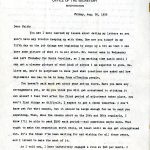
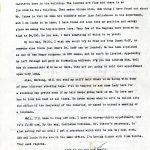
![Letter from Timuel Black to Walter Black [page 1].](https://d4804za1f1gw.cloudfront.net/wp-content/uploads/sites/3/2023/07/Black-letter-page-1-150x150.jpg)
![Letter from Timuel Black to Walter Black [page 2].](https://d4804za1f1gw.cloudfront.net/wp-content/uploads/sites/3/2023/07/Black-letter-page-2-150x150.jpg)
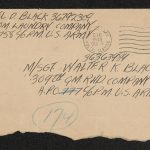
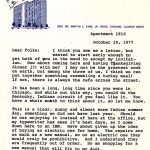
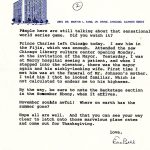

Add a comment to: Historic Pen Pals in the Vivian G. Harsh Research Collection